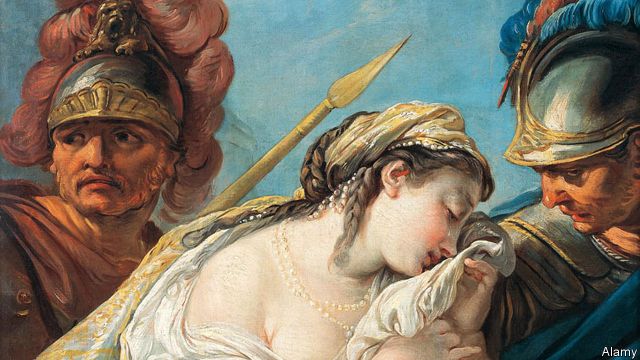
In honor of my upcoming novel, Companion of the Ash, I would like to provide an introduction to the women whom Homer included in his epic eighth-century B.C. work, The Iliad. There are many women in The Iliad, but I am focusing on four–the four who I have included in my novel.
Bearing in mind that women in ancient literature were often treated as “extras,” serving the needs of men and as a sort of window-dressing for the author, I will do my best to illuminate the characters as they were revealed to us by Homer. We have a sorceress, an unpleasant woman, and women who are incessantly sad. These were pretty much standard roles women were relegated to in ancient literature.
Women were also only given roles in relation to men–they were the mothers, sisters, wives, and daughters of heroes and villains. Women did not appear in ancient texts as free-standing characters, unanchored to men. One exception to this is Penthesilea, the Amazon Queen, who does appear in The Iliad and other ancient works. It should be noted, however, that the Amazons as a group were described as “man-like,” and thus were given a sort of license to stand on their own as characters devoid of male counterparts–other than the centaurs, who were not fully men.
Kassandra
Kassandra was sister to Hector, Paris, and Helenus. She was the daughter of King Priam and Queen Hecuba. Thus, she was a princess of Troy. She was single, and, as such, served in the only real capacity a single woman could in the ancient world–as a priestess. She was also a “seer,” with the gift of prophecy. For this, she was considered insane. It is Kassandra who warned Paris not to go to Sparta because he would meet Helen, and it was Kassandra who predicted the fall of Troy at the end of the Trojan War. But she was cursed–no one believed any of her prophecies, even though they were all true.
Hecuba
Queen Hecuba appears in several ancient works, but I will focus on her role in The Iliad here. She is best known, perhaps, for being a mother–of nineteen children. These children include the heroes Hector and Paris, and the scholar and prophet (who people believed), Helenus. She was also mother to Kassandra, who she dismissed as insane. She appears in Homer’s work at prayer, and as–variously–a doting, anxious, and grieving mother.
Helen
It is on Helen’s shoulders upon which the entire Trojan War rests. We know now the famous quote, “the face that launched a thousand ships.” Well, it was also the face that brought down a great city. Helen returning to Troy with Paris was the literary cause of the Trojan War (but almost definitely not the historical cause). Homer paints her as sorrowful and regretful–perhaps even as a woman who misses her husband Menelaus in Sparta. In The Iliad, she is reunited with Menelaus in the end, after the fall of Troy and the death of Paris. She is a rather pathetic figure, considering the war is her fault.
Andromache
Andromache is the wife of the hero Hector. This connection is so central to her character that in Book 22 of The Iliad, Andromache is not even named. She is simply referred to as “the wife of Hector,” despite being a relatively major character in the work. Throughout the epic, Andromache is seen weeping and carrying on over deaths and deaths-to-come. She is portrayed as a weak woman; a woman who exists only for the purpose of providing emotional responses to her husband’s deeds. She is never given a full character of her own.
And it is to Andromache that I turned in writing my novel. I was taking a writing class in Derbyshire, England, in 2003, and the instructor asked us to answer the question, “What if?” After much scribbling and musing, I came up with the question: “What if Andromache was a strong, capable, fully-developed character?”
And, thus, Companion of the Ash was born. It is set for release this year from Spider Road Press. The story is a sequel to The Iliad, starting at the death of Hector. It is told through the eyes of a strong, courageous Andromache.
I thought, after twenty-eight centuries, she deserved as much.

Thank you dear for a preview of your novel. While I’m not a student of The lliad (it’s been forever since I read it) I appreciate the synopsis. Am eagerly awaiting November Love Ya Peppy
Sent from my iPad
>
LikeLike
Reblogged this on Kate Spitzmiller: Remember the Ladies.
LikeLike
I recently attended a terrific production of Euripedes’ “Hecuba” at CU Boulder, so this post was welcome news! I’m looking forward to reading your novel very much.
LikeLiked by 1 person
Hi Nadeen! I’m glad you enjoyed the post. I love “Hecuba.” I’m so glad you are looking forward to my novel :). I will let you know when it is released (some time in the first week of December) and I will send you an Amazon link. Nice to hear from you. I hope you are well and that you had a nice Thanksgiving!
LikeLike
Thanks for posting thiss
LikeLike